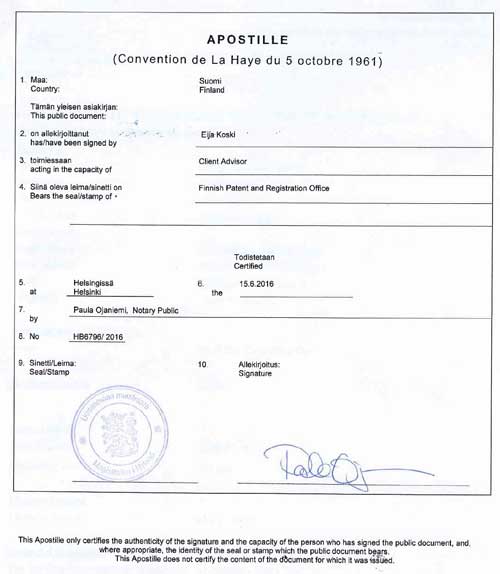
Schmidt & Schmidt covers the full spectrum of legalization services for documents issued in Finland.
Finland joined the Hague Convention on the Simplified Authentication of Documents on 27 June 1985; the Convention entered into force on 26 August 1985.
The apostille, or the “Hague apostille” is a certificate that authenticates the origin of a public document (e.g., a birth, marriage or death certificate, a judgment, an extract of a register or a notarial attestation). It confirms the authenticity of the signature and the authority of an official who signed the public document.
Documents issued in Finland are certified with an apostille in accordance with the Hague Convention of 1961 are recognized in all Member States of the Hague Convention and do not require any other form of certification, such as consular legalization, which considerably reduces the costs and time required for the certification of documents. So far, more than 120 states have joined the Convention.
The apostille is not sufficient for use in the states that are not party to the Hague Convention. In this case, consular legalization applies to a public document.
Designated Competent Apostille Authorities in Finland
In Finland, the process of obtaining an Apostille certificate is carried out at the Local Register Office. If required, an official translation of the document into the language of the receiving country must also be provided, along with an attached Apostille certificate.
All notaries public in Finland have been designated as Competent Authorities since January 1, 1985. Notaries public are appointed by Local Register Offices and hold their positions in accordance with the Notary Public Act (893/1996). There is no centralized register of all notaries public, but they are all working at Local Register Offices.
The Apostille certificate can be affixed to public documents, including certificates and documents issued by public authorities. It can also be attached to translations done by an official translator or documents signed by a physician. The purpose of the Apostille certificate is to verify the signature on the document, the capacity in which the person signing the document acted, and the seal or stamp associated with the document. It should be noted that the Apostille certificate does not certify the contents of the document.
The apostille in Finland is a square stamp in Finnish with the obligatory heading "Apostille" and a reference to the 1961 Hague Convention in French (Convention de La Haye du 5 octobre 1961). The apostille certificate’s sides will be at least 9 centimeters long.
Types of documents

| Can be apostillized | Cannot be apostillized |
|---|---|
|
|
Specific aspects and document requirements for the apostille in Finland
An Apostille is necessary when you need to verify the official capacity of the person who signed a document. This certification is required for documents intended for presentation to public authorities in countries that are part of the Apostille Convention.
An Apostille can only be obtained for documents issued by a public authority or a comparable entity, such as authorized translators or licensed physicians. For private documents, an Apostille can be obtained after the notary public has certified the competence of the signer or the authenticity of the signature.
The Apostille is typically required only for documents used abroad. In Nordic countries or within the EU, certain general documents issued by public authorities, such as those related to birth, death, name, marriage, residence, or citizenship, usually do not require an Apostille.
To obtain an Apostille for a document in Finland, a similar procedure is followed, which generally involves the following steps:
- Submit the original document to one of the offices of the Digital and Population Data Services Agency, either by post or by visiting the agency in person.
- If the receiving country requires an Apostille for a document issued by a non-public authority, the notary public must first certify either the authenticity of your signature or your authority to act on behalf of the person who signed the document. Once this certification is completed, the Apostille can be attached to the document. If the document requires proof of signature, a personal visit to the agency is necessary.
- If you prefer to deliver the document in person, you can schedule an appointment with a Notary Public.
Document requirements that might apply:
- The document should bear the original stamp of the issuing authority, clearly displaying the name of the authority.
- The document must include the signature and printed name of the individual who applied for the stamp.
- The position or official title of the person who stamped the document should also be indicated.
Documents to be used in Nordic countries do not need an apostille stamp. These documents only need to be certified by a notary republic.
The apostille is issued in a uniform format. In Finland, it has the form of a printed sticker with a handwritten signature of an official, an official seal, and a hologram.
In cases where apostilles are not recognized, holders of foreign documents will need to legalize them instead. However, If the country of destination of the document recognizes and issues apostilles, then legalization is unnecessary.
Legalization of Finnish educational documents for use abroad
In order for educational documents issued in Finland, such as school reports, university degree certificates, transcripts of records, enrollment certificates, and other school or university certificates, to be recognized and accepted abroad, they need to go through a certification process involving either legalization or apostille. The Ministry of Foreign Affairs in Finland is responsible for conducting the legalization process.
The purpose of legalization is to verify the signature and certify the authority of the issuing entity. This process is carried out in English. It is important to note that each document requiring legalization must bear the original signature of a public official, with the signatory's name written in block letters. Please be aware that documents downloaded and printed from the e-services of the Digital and Population Data Services Agency are not eligible for legalization. Additionally, certified electronic diplomas issued by universities cannot be legalized.
Once your document has been legalized at the Ministry for Foreign Affairs, you must submit it for further verification at the diplomatic mission of the country in Helsinki where you intend to use the documents.
Recognition of the authenticity of public documents within the EU
Nordic Countries Agreement
If you're submitting documents from one of the Nordic countries, you should submit either the original document or a certified copy of the original. The copy can be issued by the same authority that issued the original document or by any other authorized authority in an EU Member State that is permitted to issue certified copies. There is no need for translation of the document.
Contracting states of the Vienna CIEC Convention of 08.09.1976 (issuance of multilingual extracts from civil status registers: birth, marriage, and death certificate) are:
- Austria, Germany, Bosnia-Herzegovina, Bulgaria, Estonia, France, Italy, Cape Verde, Cyprus, Lithuania, Luxembourg, Macedonia, Moldova, Montenegro, Netherlands, Poland, Portugal, Romania, Switzerland, Serbia, Slovenia, Spain, Turkey.
Regulation on public documents (EU) 2016/1191 of 6 July 2016
Furthermore, Regulation (EU) 2016/1191 of 6 July 2016 on public documents simplifies the circulation of certain public documents that must be presented in an EU Member State and have been issued in another EU Member State, thus exempting public documents from the confirmation of authenticity with the Apostille with the aim of reducing administrative burden and costs for citizens.
Consular legalization of Finnish documents for use abroad
Consular legalization is more complex, time-consuming and costly than the simpler apostille procedure. Whereas apostille is usually issued within one step, consular legalization requires several pre-certifications before a public document can be certified at the embassy or consulate of the destination country in Finland.
It is a common requirement that the document has to be translated into the official language of the destination country before submission to the embassy. It is up to the diplomatic mission to decide about the authentication procedure.
The main differences between an apostille and consular legalization of documents
The common feature between apostille and consular legalization is that they authenticate an official document for presentation to institutions in another country. However, they have many differences.
| Apostille | Consular legalization | |
|---|---|---|
| Legal effect | Can be used in all countries that are party to the Hague Convention on the Simplified Legalization of Documents. | Use between States one or both of which is not a member of the Hague Convention, or where one of the contracting States has protested the accession of the other. |
| Difficulty | Moderate. To obtain an apostille, contact the competent apostille authority of the state of origin of the document. | High. For consular legalization, various inland authorities and a diplomatic mission of the state of destination must be involved. |
| Pre-certification | Usually not required. | Is obligatory. |
| Attestation at the state of destination embassy in the state of origin of the document | No need to contact the Consulate of the country of destination. | Is the final step of legalization. |
Apostille and consular legalization in all cities of Finland
Schmidt & Schmidt provides apostille and consular legalization services for public documents originating from all regions across Finland. We handle the entire process, from document review to obtaining the necessary certifications, ensuring that your documents are valid and recognized internationally. With our reliable services, you can confidently use your Finland public documents abroad.
Procurement of documents from Finland
If the important documents are lost or damaged, or current copies of the documents are needed, the re-issue of the documents is required. It is not unusual for people outside Finland to encounter difficulties with obtaining new documents when abroad. Our consultants will help you procure new documents from Finland remotely, and we can arrange for your documents to be sent by courier anywhere in the world.
Certified translation of documents from Finland
Copies and transcripts of civil status documents can be translated into any language by a sworn translator in Finland or the translation can be done in the country of destination. We offer certified translations of civil status documents with further certification. The cost of the work is calculated according to the volume of the document in question.
Does the translation have to be apostillized?
Any foreign document issued in one country and used in another country must be legalized for use abroad. Therefore, the authenticity of a certified translation from Finland needs to be certified by an apostille. Consequently, many authorities may not accept certified translations from Finland if the translation has not been properly authenticated in Finland for use abroad. To avoid this confusion, translations should better be made in the state of the destination of the document.







































